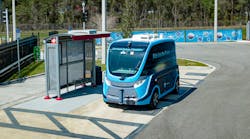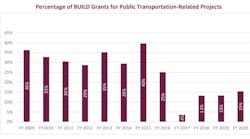USDOT makes $1.5 billion in RAISE grants available
A Notice of Funding Opportunity (NOFO) has been published by the U.S. Department of Transportation (USDOT) for $1.5 billion through the Rebuilding American Infrastructure with Sustainability and Equity (RAISE) discretionary grant program. The popular program helps communities around the country carry out projects with significant local or regional impact.
RAISE discretionary grants, which were originally created under the American Recovery and Reinvestment Act as TIGER grants, can be used for a wide variety of projects. Recent examples of funded projects include dedicated bus lanes in Baltimore, highway and bridge repair in New Mexico, dock replacements in Alaska, and a rail-to-trail project in Arkansas. Overall, USDOT has awarded $9.9 billion to more than 700 projects.
"The RAISE program helps communities large and small fix and modernize their infrastructure,” said Transportation Secretary Pete Buttigieg. “This year, thanks to the president’s Bipartisan Infrastructure Law, we can support more projects than ever, and help make our transportation system safer, more accessible and more sustainable for people across the country.”
This is the first discretionary funding program to accept applications as directed by President Biden’s Bipartisan Infrastructure Law. The $1.5 billion in available funding for 2022 represents a 50 percent increase in available funds compared to last year, when applicants requested $10 in funding for every $1 available. In 2021, RAISE funded 90 projects in 47 states, the District of Columbia and Guam.
RAISE projects are rigorously reviewed and selected based on merit. Projects will be evaluated on statutory criteria of safety, environmental sustainability, quality of life, economic competitiveness and opportunity, state of good repair, partnership and innovation. New this year, under the Bipartisan Infrastructure Law, 2022 RAISE applications will also be evaluated on the criteria of mobility and community connectivity. USDOT will assess projects for universal design and accessibility for travelers, as well as consider how proposals increase mobility for freight and supply chain efficiency.
At least $15 million in funding is guaranteed to go towards projects located in Areas of Persistent Poverty or Historically Disadvantaged Communities. Under the Bipartisan Infrastructure Law, RAISE expands the number of communities eligible for 100 percent federal share of funding, specifically those in rural communities, Areas of Persistent Poverty and Historically Disadvantaged Communities. To help reach this goal, the department has launched a tool that will allow applicants to determine if their project location is considered as a Historically Disadvantaged Community.
As was the case last year, the department is encouraging applicants to consider how their projects can address climate change, ensure racial equity and remove barriers to opportunity.
This year, USDOT is also encouraging applicants to consider how their projects can create workforce development opportunities. Applicants can be more competitive in the process if they are creating jobs with free and fair choice to join a union and good labor standards, creating jobs that underserved communities can access or are supporting worker opportunities and training. Applicants are also encouraged to utilize registered apprenticeship and local and economic hire agreements. The RAISE program is one way the Bipartisan Infrastructure Law acts on President Biden’s promise to bring good-paying jobs to local communities.
Also new this year, the evaluation process has been updated for 2022 to provide more explicit detail to applicants.
The deadline for applications is 5:00 p.m. EST on April 14, 2022, and selections will be announced no later than Aug. 12, 2022.



